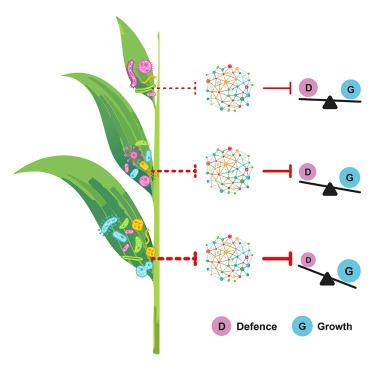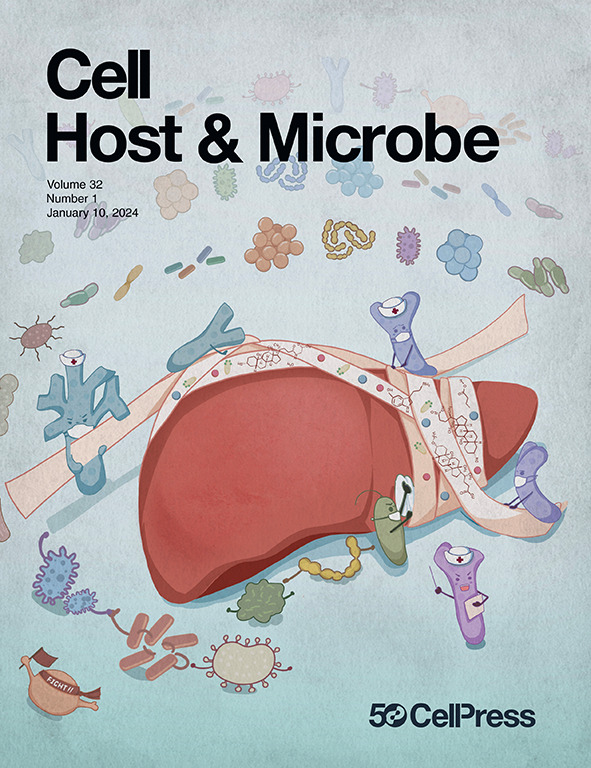Individual leaf microbiota tunes a genetic regulatory network to promote leaf growth
IF 18.7
1区 医学
Q1 MICROBIOLOGY
引用次数: 0
Abstract
In natural ecosystems, microbes have the ability to stably colonize plant leaves, overcoming the fluctuating environmental conditions that the leaves represent. How the phyllosphere microbiota influences the growth of individual leaves remains poorly understood. Here, we investigate the growth of Zea mays (maize/corn) leaves in plants grown in three soils with differing amounts of nutrients and water and identify a leaf-growth-promoting effect driven by the leaf microbiota, which we also validate in field studies. We built and used a bacterial strain collection for recolonization experiments to study the microbiota-mediated mechanisms involved in leaf growth promotion. We demonstrate that prevalent bacteria inhabiting young leaves promote individual leaf growth. Using transcriptomic analyses, we reveal a defense-related genetic network that integrates the beneficial effect of the phyllosphere microbiota into the leaf development program. We demonstrate that the individual leaf microbiota differentially represses this genetic network to modulate the growth-defense trade-off at single-leaf resolution.

单个叶片微生物群调节遗传调控网络以促进叶片生长
在自然生态系统中,微生物有能力稳定地在植物叶片上定居,克服叶片所代表的波动的环境条件。层球微生物群如何影响单个叶片的生长仍然知之甚少。在这里,我们研究了在三种不同养分和水分的土壤中生长的玉米/玉米叶片的生长,并确定了叶片微生物群驱动的叶片生长促进作用,我们也在实地研究中验证了这一点。为了研究微生物群介导的促进叶片生长的机制,我们建立并使用菌株收集进行再定殖实验。我们证明了居住在嫩叶中的普遍细菌促进了单个叶片的生长。利用转录组学分析,我们揭示了一个与防御相关的遗传网络,该网络将叶根圈微生物群的有益作用整合到叶片发育程序中。我们证明,在单叶分辨率下,单个叶片微生物群差异地抑制这种遗传网络来调节生长-防御权衡。
本文章由计算机程序翻译,如有差异,请以英文原文为准。
求助全文
约1分钟内获得全文
求助全文
来源期刊

Cell host & microbe
生物-微生物学
CiteScore
45.10
自引率
1.70%
发文量
201
审稿时长
4-8 weeks
期刊介绍:
Cell Host & Microbe is a scientific journal that was launched in March 2007. The journal aims to provide a platform for scientists to exchange ideas and concepts related to the study of microbes and their interaction with host organisms at a molecular, cellular, and immune level. It publishes novel findings on a wide range of microorganisms including bacteria, fungi, parasites, and viruses. The journal focuses on the interface between the microbe and its host, whether the host is a vertebrate, invertebrate, or plant, and whether the microbe is pathogenic, non-pathogenic, or commensal. The integrated study of microbes and their interactions with each other, their host, and the cellular environment they inhabit is a unifying theme of the journal. The published work in Cell Host & Microbe is expected to be of exceptional significance within its field and also of interest to researchers in other areas. In addition to primary research articles, the journal features expert analysis, commentary, and reviews on current topics of interest in the field.
 求助内容:
求助内容: 应助结果提醒方式:
应助结果提醒方式:


